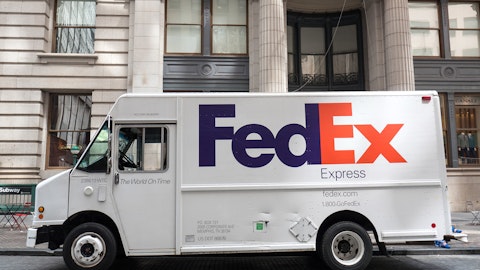Darren Field: Yes. Okay. I appreciate the question. I think that certainly the new services, we’re excited about. I don’t want to — the Mexico service announcement was a conversion from business we were handling through a different method, so I don’t want that to be portrayed as an immediate growth movement. But as we move forward, it solidifies our capacity plans for Mexico to allow us to grow further in the long-term, over the long-term future. And when I think about December, the comp was certainly easier. I think that is a factor. I also believe that our mix of customers and the particular group of shippers we serve, had a more significant peak season that they even predicted and that’s really why we’ve highlighted that the peak season was a surprise.
And I’ll even go as far as to say, our capacity, what I call the coiled spring for many quarters, solved for us this fourth quarter and that peak season, it really allowed us to execute for our customers at a very high level and we’re really, really proud of that. I’m extremely proud of my team and I want to make sure and say that.
Operator: Your next question comes from the line of Justin Long from Stephens Incorporated. Please go ahead, your line is open.
Justin Long: Thanks. And maybe I’ll pivot and ask a Dedicated question for Nick. I know there are lot of moving pieces with some fleet losses and downsizes in the last year or so, but Dedicated has been pretty resilient as well. When you put it all together, any initial expectations on the level of fleet growth for Dedicated this year? And anything outside of insurance that we should be aware of as it relates to swing factors on costs with depreciation, start-up costs, or anything else?
Nick Hobbs: Yes. I would say, just as I was thinking about and reflecting back on this year that I think we performed much better than we did in 2008 and 2009, and I’ve talked about that, just the structure of our deals, CVD, and we lost 18% of our fleet in 2009 and didn’t lose 9% — or we did lose 9%. And so, I think through that, we’ve got a better base of business, better diversified, so I feel we’ve come out of that pretty good, sets up well. I would say though that when I think about our sales, I’m just going to give you our standard line of, we’re going to sell a 1000 to 1200 trucks, just like we did last year in a really tough year. We’re going to plan on doing that again. And as I said, we’ve got some visibility to some fleet losses coming up.
And so, there is a lot of moving parts in there. But when I look at the market and what we’re after, the private fleet market, it’s really pretty stable. We’ve — some of the losses have been in our more what I would call, our business that we’ve had, legacy business, for quite some time. And so, I think our base will get more solid as we move forward with more private fleets.
Operator: Your next question comes from the line of Amit Mehrotra from Deutsche Bank. Please go ahead, your line is open.
Amit Mehrotra: Thanks, operator. Hey, everybody. Darren, I just want to understand that volume momentum question, you’re talking about volume momentum, obviously Intermodal loads were up 3% sequentially 3Q to 4Q. Usually, they go down 4Q to 1Q, but obviously, there is momentum. You’re adding the Quantum service. Do we think that that momentum can continue where you can build volumes sequentially as we move through this year? And I’m really talking about the first quarter, because obviously, it’s a seasonally tough quarter. And then just related to that, I assume your customers were talking about expectations for March and the Spring selling season. There’s a lot of disruption in the Red Sea. And maybe, customers are rethinking their supply chains.
Panama Canal and Suez Canal are down basically. So, just talk to us about that momentum building as we move over the next three months from where you are today. And then, what are your customers telling you from expectations on March and the disruption that’s happening right now in the Red Sea? Thanks.
Darren Field: That was impressive, Amit. I think that, look, as volumes came at us in the fourth quarter and like we’ve highlighted many times, our customers were even surprised by that. So, I think that the volume momentum that built during that quarter was largely related to activities that those customers had going on in the fourth quarter. And again, because they were surprised by it, I think that’s why we feel a little bit more unclear right now about what the early part of this year holds. Certainly, traditionally, the first quarter is a drop-down from the fourth quarter. I would say that for my entire career, that’s been the case and so I don’t know that I am going to guide you on what will happen, but certainly, our customers’ inability to tell us about the peak season continues to be a challenge for us to get good solid information about what to expect.
Operator: Your next question comes from the line of Chris Wetherbee from Citigroup. Please go ahead, your line is open.
Chris Wetherbee: Hey, thanks. I guess I wanted to ask about cost inflation and maybe tie it into the insurance. And so I want to get some — just trying to understand. We’ve got two years with fourth quarter hits from the insurance side. And I guess I’m trying to figure out what that means for the go-forward periods. So does the charge that you take in this fourth quarter mean that there is some degree of incremental approvals that are required for 2024? And then, maybe if we could just tie that into the broader cost inflation. If you look at the portfolio of the businesses, where do we think cost inflation is kind of running as we’re getting into 2024?
John Kuhlow: Yes. Well Chris, I’ll take that, again. It’s John Kuhlow. With respect to the insurance, we did have a charge last year in the fourth quarter. This really relates to continuing to see what we refer to as unprecedented settlements in our prior year claims. We had a situation where we ran out of our coverage limits in those periods. And so, we’re effectively self-insured. Each quarter, we go through and we assess our reserves and working with our actuaries, we needed — we determined that we need to take up our reserves. Can’t say that this will never happen again, but we do believe that the charge that we took for our reserves, that makes them properly valued now. As I mentioned before, we do — our approach is to maintain coverage for all of our businesses.
And we are taking that up and we did a little bit in 2023 and taking that up in 2024 and going forward. Just to give — with respect to the current environment and how we’re seeing these settlements claimed, so — or how we see these claims settled. So, that’s really where we’re seeing the most pressure. We are again continuing to look at our reserves on a quarterly basis. But I feel like most of the inflation that we’re seeing is through the cost premiums that we have from our underwriters.
Operator: Your next question comes from the line of Allison Poliniak from Wells Fargo. Please go ahead, your line is open.
Allison Poliniak: Hi, good evening. Just want to go back, Nick, to the Dedicated, the fleet downsizing, I know it was less than sort of the 2009, but what’s your visibility on being able to reallocate that capacity fairly quickly? And then you also talked along that there was a pipeline of opportunities. Anything specific about the verticals of those opportunities that may be more defensible, or is it people just sort of preparing for whatever inflection may come here, just any thoughts? Thanks.




